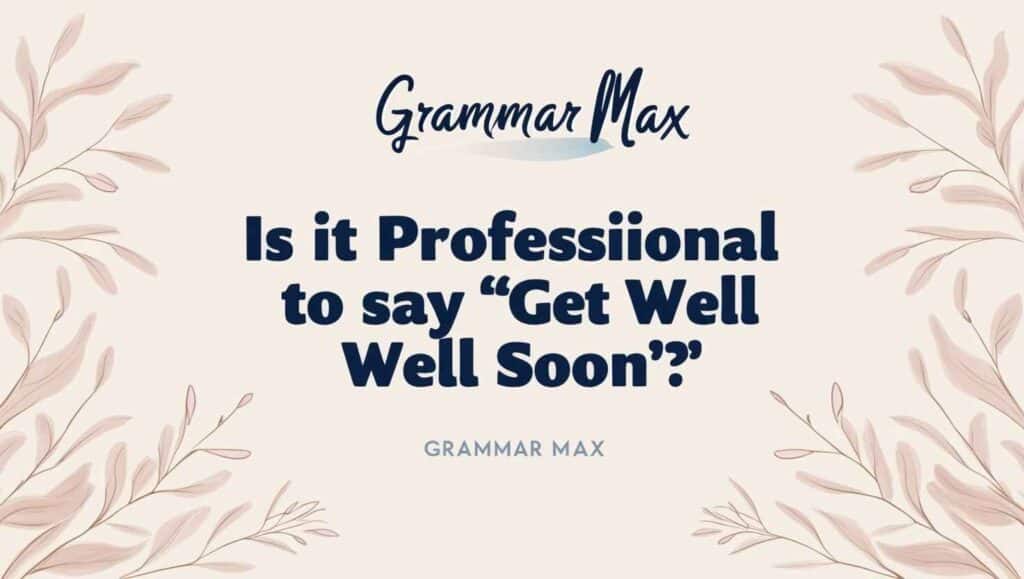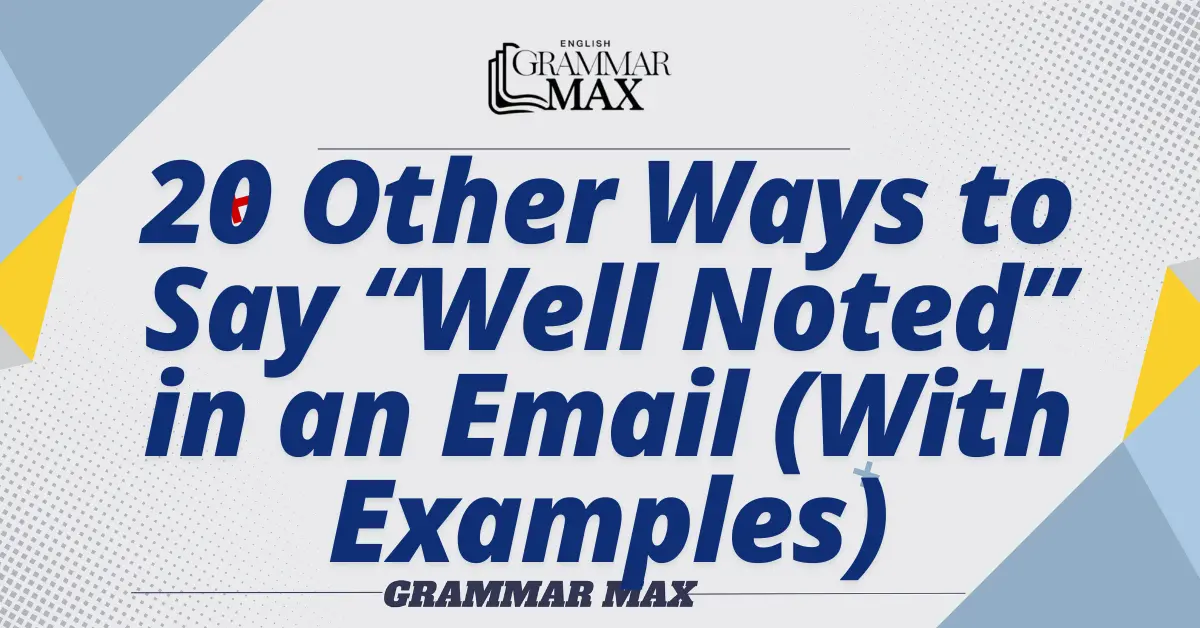When someone you know is feeling unwell, offering support through words can make a significant difference. In a professional setting, sending a thoughtful message is essential to convey care and concern without being overly familiar. This article explores 21 ways to say “Get well soon” professionally, providing suitable examples and contexts for each phrase.
Alternative ways to say “Get Well Soon”

Here’s 21 alternatives to say “Get Well Soon”:
- I Wish You a Speedy Recovery
- I Hope You Feel Better Soon
- Get Well Soon
- Wishing You a Full and Fast Recovery
- Take Care of Yourself
- Wishing You Strength and Healing
- Looking Forward to Your Recovery
- Sending You Positive Vibes for a Quick Recovery
- Please Take the Time You Need to Heal
- Thinking of You During This Time
- Wishing You Comfort and Care
- Hoping for Your Quick Return
- Take All the Time You Need to Recover
- May Your Recovery Be Smooth and Quick
- Formal Get Well Soon Message
- I’m Here for You
- Wishing You Peace and Rest
- Take Care and Rest Up
- Get Well Soon, and Don’t Rush Your Recovery
- I Hope You’re Back on Your Feet Soon
- Take It One Day at a Time
1. I Wish You a Speedy Recovery
One of the most common and effective ways to express your wishes for someone’s health is by saying, “I wish you a speedy recovery.” This phrase is formal yet warm, making it ideal for workplace communications.
Best Use and Example
Use this phrase in an email or a card when someone has taken time off due to illness.
Email Example: Subject: Wishing You a Speedy Recovery Dear Sarah, I just wanted to take a moment to wish you a speedy recovery. Your contributions are greatly missed, and we look forward to having you back with us soon. Take care, Mark
2. I Hope You Feel Better Soon
This phrase is straightforward and comforting, expressing genuine concern for the person’s well-being.
Best Use and Example
Ideal for casual emails or messages, especially if you have a friendly rapport with the recipient.
Email Example: Subject: Thinking of You Hi James, I hope you feel better soon! If there’s anything you need or if you just want to chat, don’t hesitate to reach out. Best wishes, Laura
3. Get Well Soon
A classic phrase that gets straight to the point, “Get well soon” can be used in both formal and informal communications.
Best Use and Example
Use it in a quick email or message to a colleague who is out sick.
Email Example: Subject: Get Well Soon! Dear Tom, I just wanted to say get well soon! The team is looking forward to your return. Best, Angela
4. Wishing You a Full and Fast Recovery
This phrase emphasizes both speed and completeness in recovery, showing you care about their overall health.
Best Use and Example
Appropriate for formal emails or notes.
Email Example: Subject: Wishing You a Full and Fast Recovery Dear Linda, I am wishing you a full and fast recovery. Your health is what matters most, and we hope to see you back to your vibrant self soon. Sincerely, David
5. Take Care of Yourself
This phrase conveys a supportive message while encouraging self-care during illness.
Best Use and Example
Useful for both emails and verbal communication.
Email Example: Subject: Take Care of Yourself Hi Alex, I just wanted to check in and remind you to take care of yourself during this time. Your health is the priority, and we are all here to support you. Warm regards, Megan
6. Wishing You Strength and Healing
This phrase is more personal and encourages a positive mindset towards recovery.
Best Use and Example
Suitable for a card or a thoughtful email.
Email Example: Subject: Sending Strength Your Way Dear Priya, Wishing you strength and healing during your recovery. I hope you find comfort in the support of those around you. Take care, Ben
7. Looking Forward to Your Recovery
This phrase expresses optimism about the recipient’s return.
Best Use and Example
Good for professional emails, especially if you are waiting for their input on a project.
Email Example: Subject: Looking Forward to Your Recovery Hi Michelle, Just a note to say that we’re looking forward to your recovery. Your insights are invaluable, and we can’t wait to have you back with us. Best wishes, Chris
8. Sending You Positive Vibes for a Quick Recovery
A more informal yet encouraging phrase that is still appropriate in many workplace settings.
Best Use and Example
Great for team chat platforms or informal emails.
Email Example: Subject: Positive Vibes Hey Dan, Just sending you positive vibes for a quick recovery! We miss having you around. Best, Jessica
9. Please Take the Time You Need to Heal
This phrase respects the individual’s need for time off, emphasizing their health over work responsibilities.
Best Use and Example
Perfect for a formal email to a colleague or employee.
Email Example: Subject: Prioritize Your Health Dear Robert, Please take the time you need to heal. Your well-being is our top priority, and we look forward to your return when you’re ready. Best, Emma
10. Thinking of You During This Time
A phrase that shows you are keeping them in mind while they are unwell.
Best Use and Example
Suitable for a personal touch in emails or cards.
Email Example: Subject: Thinking of You Hi Emma, I wanted to reach out and let you know that I’m thinking of you during this time. If you need anything, don’t hesitate to ask. Take care, Michael
11. Wishing You Comfort and Care
This phrase highlights both emotional and physical support.
Best Use and Example
Appropriate for a card or a more personal email.
Email Example: Subject: Wishing You Comfort Dear Sarah, Wishing you comfort and care during your recovery. Remember to take it easy and allow yourself to rest. Warm regards, Tom
12. Hoping for Your Quick Return
This phrase expresses eagerness for the person’s return while wishing them well.
Best Use and Example
Useful in a professional context, especially if they play a critical role in the team.
Email Example: Subject: Hoping for Your Quick Return Hi John, I’m hoping for your quick return! Your contributions are missed, and I’m looking forward to having you back on the team. Best, Lisa
13. Take All the Time You Need to Recover
This phrase conveys understanding and support, reassuring the recipient that their health comes first.
Best Use and Example
Ideal for formal emails to colleagues or employees.
Email Example: Subject: Take Your Time Dear Anna, Take all the time you need to recover. We are here to support you, and work can wait until you’re back on your feet. Sincerely, Rachel
14. May Your Recovery Be Smooth and Quick
A positive and encouraging phrase that expresses hope for an easy recovery.
Best Use and Example
Suitable for a formal or semi-formal email.
Email Example: Subject: Wishing You a Smooth Recovery Hi Kevin, May your recovery be smooth and quick. We all miss you and look forward to seeing you back in good health. Best wishes, Sandra
15. Formal Get Well Soon Message
Sometimes a simple, formal approach is best. Just stating “Get well soon” in a more structured format can also be effective.
Best Use and Example
Ideal for formal communication in corporate environments.
Email Example: Subject: Get Well Soon Dear Michael, I wanted to extend my sincere wishes for your health. Get well soon; the team is looking forward to your return. Best regards, John
16. I’m Here for You
This phrase emphasizes your support and willingness to help the person during their recovery.
Best Use and Example
Use it in an email to show your commitment to assist them if needed.
Email Example: Subject: I’m Here for You Dear Rachel, I just wanted to let you know that I’m here for you during your recovery. If you need anything or just want to talk, feel free to reach out. Take care, David
17. Wishing You Peace and Rest
This phrase focuses on the importance of rest and tranquility during the recovery process.
Best Use and Example
Suitable for a thoughtful card or an email.
Email Example: Subject: Wishing You Peace Hi James, Wishing you peace and rest as you recover. Remember to take it easy and let your body heal. Best wishes, Laura
18. Take Care and Rest Up
A simple yet effective phrase, encouraging the recipient to focus on their health.
Best Use and Example
Great for a casual email or team message.
Email Example: Subject: Rest Up! Hey Tom, Just a quick note to say take care and rest up! We’re all looking forward to having you back soon. Best, Angela
19. Get Well Soon, and Don’t Rush Your Recovery
This phrase reassures the person that it’s okay to take their time to heal.
Best Use and Example
Ideal for a formal email to a colleague.
Email Example: Subject: Take Your Time Dear Linda, Get well soon, and don’t rush your recovery. Your health is the priority, and we’re here to support you when you’re ready to return. Sincerely, David
20. I Hope You’re Back on Your Feet Soon
A more casual expression that conveys a sense of urgency in their recovery without being too pushy.
Best Use and Example
Good for friendly emails or team chats.
Email Example: Subject: Get Well Soon! Hi Michelle, I hope you’re back on your feet soon! The team misses your energy and contributions. Best, Chris
21. Take It One Day at a Time
This phrase encourages a gentle approach to recovery, emphasizing patience.
Best Use and Example
Appropriate for an empathetic email.
Email Example: Subject: One Day at a Time Dear Priya, Remember to take it one day at a time during your recovery. We’re all rooting for you and can’t wait to see you back in the office. Warm regards, Ben
How to Say Get Well Soon Professionally
When deciding how to say “get well soon” professionally, consider the recipient’s relationship with you and their comfort level. Always strive for sensitivity and genuine concern, making your message appropriate for the workplace.
Get Well Message for Co-Worker
Sending a get well message to a co-worker can help maintain a positive workplace culture. Whether it’s a simple email or a thoughtful card, your words can provide comfort and support.
How to Reply if Someone is Not Feeling Well Professionally
When replying to someone who has expressed that they are unwell, it’s important to acknowledge their situation and offer your support. A response can include phrases like:
- “I’m sorry to hear you’re not feeling well. Please take care of yourself.”
- “If there’s anything I can do to help, please let me know.”
Another Way to Say Feel Better Soon
You can also use alternatives like “Wishing you a swift recovery” or “Get well soon”. The key is to convey your positive thoughts and support, making the person feel valued and cared for.
Is it Professional to Say “Get Well Soon”?

Saying “Get well soon” can be professional when conveyed appropriately in the workplace. It shows compassion and support for a colleague’s health, fostering a positive work environment. However, it’s essential to consider the recipient’s relationship with you and the context of the situation. A simple, sincere message can express care without crossing professional boundaries. Using variations like “I wish you a speedy recovery” or “I hope you feel better soon” can also maintain a professional tone while still offering encouragement. Overall, expressing concern for someone’s health can enhance workplace morale and strengthen team bonds.
Frequently Asked Question
How do you professionally say “get well soon”?
You can use phrases like “I wish you a speedy recovery” or “I hope you feel better soon.”
What do you say instead of “get well soon”?
Consider saying “Wishing you strength and healing” or “Take all the time you need to recover.”
How do you wish someone well when they are sick professionally?
Use phrases like “I hope you are back on your feet soon” or “Sending you positive thoughts for a quick recovery.”
How do you say “take care” professionally?
You might say “Please prioritize your health” or “Take care of yourself during this time.”
Conclusion
Sending a thoughtful message to someone who is unwell is a simple yet powerful way to show you care. By using these 15 ways to say “get well soon” professionally, you can convey your support and concern in a respectful and empathetic manner. Whether it’s through an email, a card, or a quick message, your words can bring comfort and encouragement during a difficult time. Always remember to tailor your message to the individual’s situation, ensuring that your sentiments are genuine and heartfelt.

William Henry is a writer for Grammar Max, a blog that focuses on synonyms and phrases. He loves exploring the quirks of the English language and enjoys helping readers improve their vocabulary. William’s articles are easy to read, fun, and full of useful tips for anyone looking to better understand and use English. Whether you’re a student, a professional, or just someone interested in language, William’s writing on Grammar Max makes learning about words and their meanings simple and enjoyable.





